|
|
|
Sort Order |
|
|
|
Items / Page
|
|
|
|
|
|
|
| Srl | Item |
| 1 |
ID:
123316
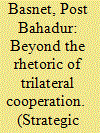

|
|
|
|
|
| Publication |
2013.
|
| Summary/Abstract |
Over the past few years, 'trilateral economic cooperation' and 'vibrant bridge' have become buzzwords in Nepal's foreign policy discourse, and have also caught the popular imagination at home in India. These proposals have generated both curiosity and anxiety in Delhi's diplomatic and academic circles that are otherwise largely indifferent to Nepal. The Chinese diplomats in Delhi also raising the issue with the Indian officials has added to India's anxiety all the more. With some notable exceptions (e.g., C. Raja Mohan, 'Three to Tango', The Indian Express, 7 May 2013), there is more or less consensus in India that such proposals from Nepal, if received formally, should be rejected outright, although some have prescribed the 'wait and see' approach as the best policy option for now. Moreover, the proposal has received prominence at a time when media reports about 'Chinese incursion into Ladakh' have flummoxed many policymakers in Delhi. While the Indian mandarins now seem to be handling the issue somewhat prudently, the supposed Chinese 'forward policy' across the Himalayas has already set alarm bells ringing, bringing back memories of the 'uncalled-for Chinese aggression' on India in 1962. It is in this context-'Chinese manoeuvres' across the Himalayas-that the rationale behind such plans in the changing dynamics of India-China-Nepal relations should be analysed.
|
|
|
|
|
|
|
|
|
|
|
|
|
|
|
|
| 2 |
ID:
123312
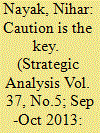

|
|
|
|
|
| Publication |
2013.
|
| Summary/Abstract |
Pushpa Kamal Dahal, alias Prachanda, made the trilateral proposal during his official visit to India in April 2013. This was the third time since 2010 that Prachanda had raised this issue. This concept seems to be a modified version of his earlier 'equidistance policy', which was declared after he became prime minister in September 2008. He proposed trilateral cooperation for the first time in October 2010 after visiting Beijing. He reiterated it after signing a Memorandum of Understanding (MoU) with the Asia Pacific Exchange and Cooperation Foundation (APECF) for development of Lumbini in November 2012 in Shanghai. He again proposed the same during his April 2013 visits to both Beijing and New Delhi. The fact of the matter is that he has reiterated this proposal each time he has returned from a visit to China. This time, in fact, he also discussed the issue directly with the Chinese president Xi Jinping. In response, Jinping first suggested working on bilateral projects: 'We [Nepal and China] can discuss later what projects can be implemented jointly by China, Nepal and India'.
|
|
|
|
|
|
|
|
|
|
|
|
|
|
|
|
| 3 |
ID:
123307
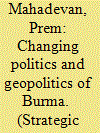

|
|
|
|
|
| Publication |
2013.
|
| Summary/Abstract |
Burma's two decades-old alignment with China, which was always an uneasy one, is being reordered to better reflect Burmese national interests. In an attempt to reach out to the West, partial democratisation has been permitted. The military remains highly influential in Burmese politics, but its desire to avoid the pitfalls of over-dependence on Beijing, together with confidence that separatist movements pose a lesser threat than in the past, have led to a loosening of political control. It is now crucial to ensure that democratisation proceeds at a pace that Burma's fragile polity can absorb, and does not lead to new internal conflicts.
|
|
|
|
|
|
|
|
|
|
|
|
|
|
|
|
| 4 |
ID:
123303
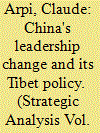

|
|
|
|
|
| Publication |
2013.
|
| Summary/Abstract |
Two new factors have appeared on the Tibetan political scene after the recent leadership change in China. First, the 'spiritualisation' of politics: paradoxically, the atheist Chinese Communist Party (CCP), also known as The Communist Party of China (CPC) seems increasingly interested in 'spiritual' matters. The CCP has started promoting reincarnated Lamas, known in China as 'Living Buddhas', in a big way. The purpose is to prepare for the post-Dalai Lama era. The second new development is the emergence of a 'Tibet Gang'. A string of officials who have been posted to or connected with Tibet at one point or another in their career have now joined the Politburo, the government or the top rung of the Party. This article will study these developments and look at the possible implications.
|
|
|
|
|
|
|
|
|
|
|
|
|
|
|
|
| 5 |
ID:
123315


|
|
|
|
|
| Publication |
2013.
|
| Summary/Abstract |
Integrating the restive Tibetan minority with China has been the primary domestic challenge for Beijing. Thus far, its Nepal policy has been crafted essentially to address the Tibetan question. The idea of trilateral cooperation between India, Nepal and China apparently floated by Pushpa Kamal Dahal (Prachanda) in April 2013 was, in effect, first made by the former Chinese ambassador to Nepal, Yang Houlan, in 2012. Calling Kathmandu a trade gateway to New Delhi, he said: 'From an economic viewpoint, Nepal links China (with 1.3 billion people) with South Asia (with 1.5 billion people) the huge common market (that) provides great opportunities for both China and South Asia'.
|
|
|
|
|
|
|
|
|
|
|
|
|
|
|
|
| 6 |
ID:
123305
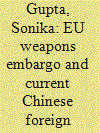

|
|
|
|
|
| Publication |
2013.
|
| Summary/Abstract |
This article examines the EU weapons embargo on China as a major foreign policy challenge that China's new leadership has inherited. The article argues that the continuation of the embargo constitutes a failure of Chinese foreign policy to project China as a responsible global player. The article examines the legal framework and the political debate within the EU to emphasise that the embargo has been largely ineffective in its objective of denying advanced military technology to China. The continuation of the ban, however, suggests that China, while becoming an economic and military power, is finding it difficult to overcome the significant political resistance to it being accepted as a responsible global actor.
|
|
|
|
|
|
|
|
|
|
|
|
|
|
|
|
| 7 |
ID:
123317
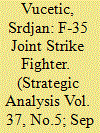

|
|
|
|
|
| Publication |
2013.
|
| Summary/Abstract |
The United States dominates global defence markets, but the nature of this dominance is shifting. Strategic and budgetary considerations-the latter being constantly restructured by the rising relative cost of defence labour-drive US defence production towards international collaboration. In this essay, I examine the politics of a high-calibre international collaborative programme that has made headlines in recent years: the F-35 Joint Strike Fighter (JSF). What motivated the US government to take on partners, and what influence, if any, have the partners had on the programme so far? Also, how have the partner governments dealt with the mounting controversies surrounding this programme?
With respect to the first two questions, my goal in this essay will be to provide an overview of the programme, including the most up-to-date progress report. As for the third question, what interests me-and I recognise the question brings into play a much broader political analysis-is the manner in which partner governments have publicly justified participation in a US-controlled weapons programme that is handicapped by rising costs, delays and performance shortfalls. All major arms acquisitions involve public exchanges over complex trade-offs among capability, costs, job-creation and strategy, which, I suggest, can contribute to the understanding of the politics of arms production and arms transfers. Judging by the positions taken by supporters and opponents across national debates on F-35 acquisition in the 2009-2012 time period, the partner countries appear to be resigned to their fate as rule-takers in the programme. A seemingly impending cut in production quantities will affect them all, but the combination of sunk costs and alliance politics is likely to compel the partners to stay the course, even if it means reducing 'original' individual orders by 50 per cent or more.
|
|
|
|
|
|
|
|
|
|
|
|
|
|
|
|
| 8 |
ID:
123301
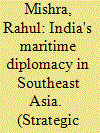

|
|
|
|
|
| Publication |
2013.
|
| Summary/Abstract |
INS Sudarshini, India's Sail Training Ship (STS), was sent on a commemorative expedition to the Association of South East Asian Nations (ASEAN) member countries for six months along the monsoon trade winds route to trace India's civilisational and cultural affinities and rejuvenate trade and maritime linkages with its neighbours in the East. The voyage was part of the commemoration of the successful completion of two decades of India's Look East Policy, 20 years of dialogue relations with ASEAN, and 10 years of India-ASEAN summit-level partnership. The expedition, a collaborative venture of India's Ministries of Defence and External Affairs, traced sea routes developed centuries ago, linking India with countries of the Southeast Asian region. The heartening reception of the INS Sudarshini expedition across the Southeast Asian region has underscored the point that India's maritime diplomacy has been a success in the region. The expedition also highlights the point that since India and Southeast Asia are immediate neighbours, there is a need to work towards ensuring greater connectivity between India and the countries of the region. As part of the commemoration, an India-ASEAN car rally was also organised, covering about 8,000 km and nine out of 10 ASEAN states. It is worth mentioning that India shares a land boundary with Myanmar and a maritime boundary with three Southeast Asian nations. The success of the INS Sudarshini expedition (and the India-ASEAN car rally) clearly indicates that compared to the situation during the 1980s and early 1990s, a substantive perceptual change has come about in the Southeast Asian approach towards India.
|
|
|
|
|
|
|
|
|
|
|
|
|
|
|
|
| 9 |
ID:
123313
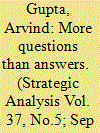

|
|
|
|
|
| Publication |
2013.
|
| Summary/Abstract |
Prachanda's proposal for trilateral cooperation between India, Nepal and China seems reasonable on the face of it. However, both China and Nepal should be aware that it will create a lot of misunderstandings in India. The reasons for this are as follows:
It is an insufficiently articulated proposal. No details are available. It has not been discussed with India formally. Does the trilateral cooperation confine itself to economic sectors, or does it also include cooperation in social sectors? Does it entail political cooperation too? These are some of the questions that create confusion regarding the objectives behind these proposals.
Does this proposal have the official backing of the UCPN Maoist party? Do other parties support it? Does the government of Nepal support it? Has a formal démarche been issued to the Government of India? The proposal seems to have been discussed in China. But with whom? Some Chinese officials and scholars have spoken about it. Has this been prompted on behalf of the Chinese? Have the Chinese officially taken up the proposal with the Indian side?
|
|
|
|
|
|
|
|
|
|
|
|
|
|
|
|
| 10 |
ID:
123314


|
|
|
|
|
| Publication |
2013.
|
| Summary/Abstract |
Trilateral cooperation between India, Nepal and China needs to be seen from the perspective of how beneficial it is for all three countries. However, such cooperation cannot be divorced from India's security concerns and its close relations with Nepal. Moreover, there are several issues that come into question, too. Are there any objectives behind this proposal? Does it involve only developmental cooperation? Does it undermine India's security interests?
|
|
|
|
|
|
|
|
|
|
|
|
|
|
|
|
| 11 |
ID:
123299
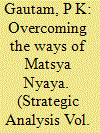

|
|
|
|
|
| Publication |
2013.
|
| Summary/Abstract |
Ancient Indian political thought as given in the niti (moral law) lays down that matsya nyaya (big fish swallowing the smaller fish), which is a law of nature, must be eradicated. However, in spite of best intentions it continues to prevail in internal and international politics. Society is bound together by dharma (justice), which is the great protecting principle, and economic prosperity, moral welfare and cultural advancements are the functions of justice. Kautilya also subscribes to this view and says that if danda is not inflicted, the law of matsya nyaya (force, authority or coercion) will prevail because in the absence of the chastiser, the strong devour the weak.
|
|
|
|
|
|
|
|
|
|
|
|
|
|
|
|
| 12 |
ID:
123309
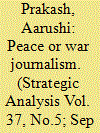

|
|
|
|
|
| Publication |
2013.
|
| Summary/Abstract |
Analysing peace journalism is a difficult task, especially within the context of an ongoing conflict. This study looks at peace journalism as it relates to the Balochistan/Pakistan conflict. Balochistan is a Pakistani province that makes up a large part of the country and is rich in natural resources. The Pakistani government has employed a policy of resource exploitation in the province, withholding any due share of profit from the Baloch. The conflict, which has been ongoing since the partition of India, has increasingly become a subject of debate in both the Pakistani and the international media, especially since the US Congress passed a non-binding resolution in favour of Balochistan's right to self-determination. This research study examines the extent of peace journalism in both the traditional and social media in Pakistan since the congressional resolution. The content analysis uses a sample of 100 articles drawn from four Pakistani newspapers, as well as 1,000 tweets from various relevant Twitter users. Using models derived from Galtung and built upon by Lynch and McGoldrick, this study reflects an apparent display of peace journalism in the working timeframe from various different sources.
|
|
|
|
|
|
|
|
|
|
|
|
|
|
|
|
| 13 |
ID:
123304
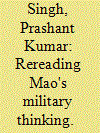

|
|
|
|
|
| Publication |
2013.
|
| Summary/Abstract |
Although the nature of warfare has changed beyond recognition since the 1920s and 1930s when Chairman Mao Zedong penned his main military writings, his military thoughts are still a point of reference for any discussion on military thinking in modern China. Developments in warfare have superseded Mao's operational principles and tactics visualised in his three-stage warfare; however, his philosophical and political understanding of war has value that transcends time and space. The present article shows that the political and military situation in China in the 1920s and 1930s shaped Mao's military thoughts, and his military ideas were an original contribution to Marxist thought. The extent to which pre-existing non-Marxist Chinese and Western scholarly traditions of strategic thinking influenced his ideas is uncertain. Mao's military ideas continue to provide normative direction in China, with the potential of opportunistic philosophical manipulation by the government. In addition, the righteous convictions of his military thoughts continue to capture the imagination of anti-system dissenters worldwide.
|
|
|
|
|
|
|
|
|
|
|
|
|
|
|
|
| 14 |
ID:
123308


|
|
|
|
|
| Publication |
2013.
|
| Summary/Abstract |
This article discusses the utility and limitations of existing space surveillance networks to address the issue of spaceflight safety and proposes a way forward. Specifically, it begins with a brief explanation of why space situational awareness (SSA) is important and draws attention to the existing major SSA networks followed by a brief summary of the major limitations of the US, Russian and Chinese networks. These limitations highlight why we collectively need to craft a better and more efficient mechanism. Finally, it concludes with a techno-political elucidation for the future.
|
|
|
|
|
|
|
|
|
|
|
|
|
|
|
|
| 15 |
ID:
123302


|
|
|
|
|
| Publication |
2013.
|
| Summary/Abstract |
In more than three decades, ever since the Islamic-oriented National Order Party was formed in 1969, Turkish politics has been analysed by many in terms of two straitjacketed views: Islamists trying to capture power on the one hand, and on the other hand the secularists or the state elite, with the help of the military, struggling to keep the country's political orientation towards the West to protect Turkey as a secular state. This image of Turkey has created some confusion among strategic analysts abroad in understanding Turkey and its policies.
An Islamist-versus-secularist understanding of Turkey gained currency when the Refah Party entered parliament as the largest party, after receiving more than 21 per cent of the votes in the 1995 general election. After becoming a coalition partner in 1996-1997 with the True Path Party with Refah leader Necmettin Erbakan as prime minister, even Turkish political analysts joined the debate on Islamists versus secularists at the domestic level. Although Erbakan was ousted from power in 1997, such debates continued to circulate in academic and political circles.
|
|
|
|
|
|
|
|
|
|
|
|
|
|
|
|
|
|
|
|
|